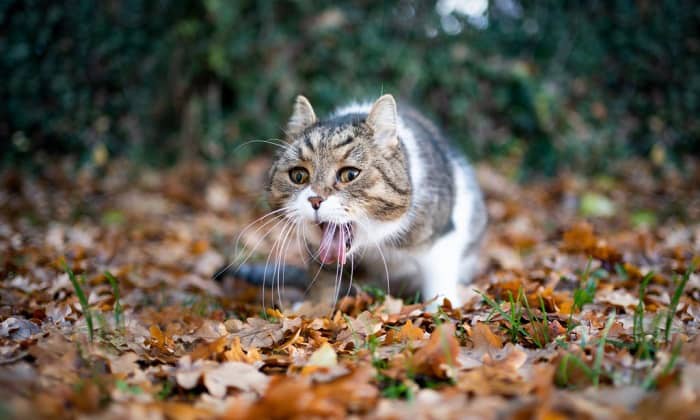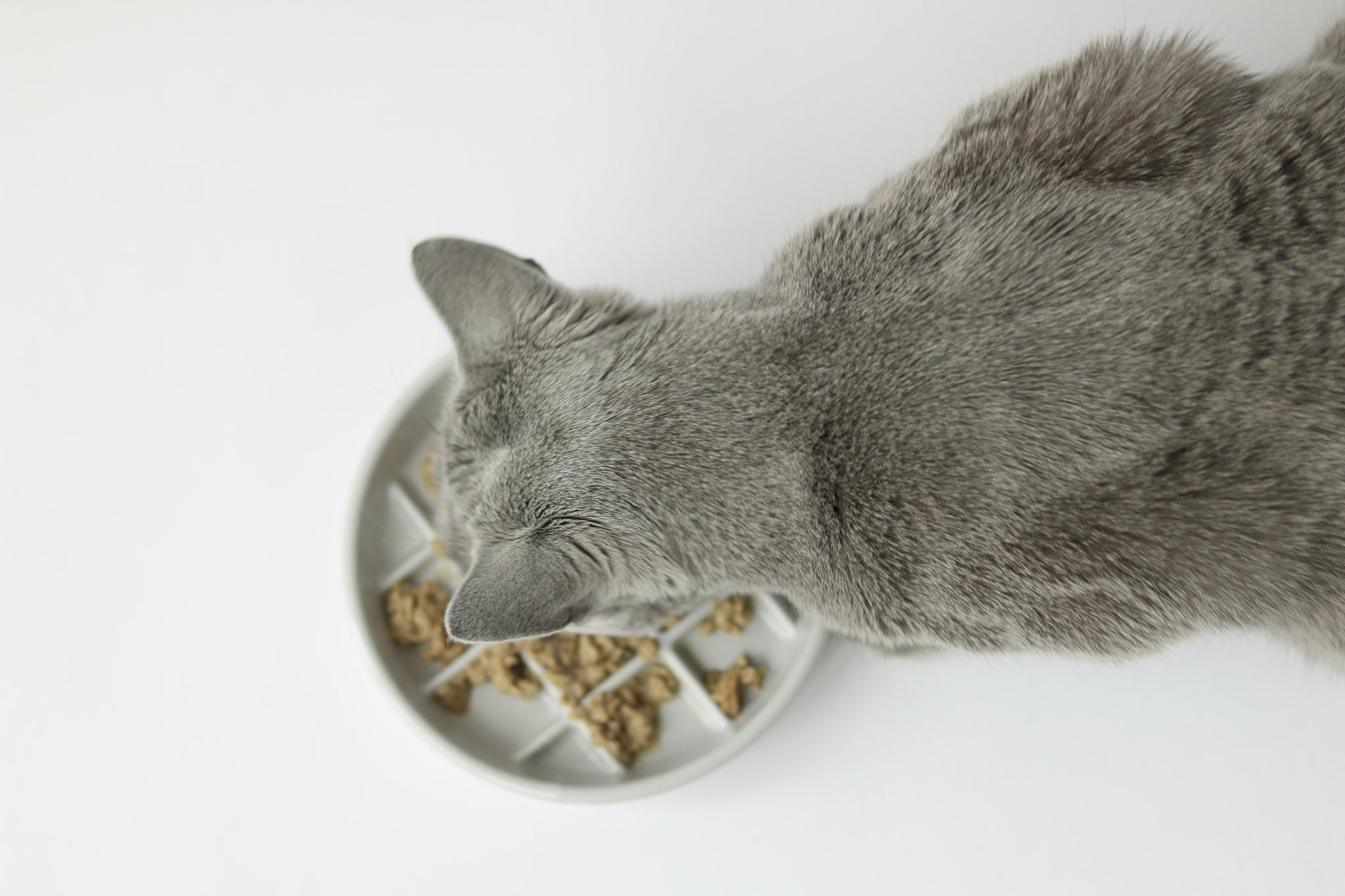The most common reason why cats throw up after eating is due to eating too quickly or overeating. Poor eating habits like gulping food can lead to indigestion, causing the cat to vomit shortly after a meal.
Additionally, some cats may have food allergies or sensitivities that trigger an upset stomach. It’s essential to monitor your cat’s eating habits and ensure they eat at a slow pace to prevent vomiting. If the issue persists or your cat displays other concerning symptoms, it’s best to consult a veterinarian for further evaluation.

Credit: www.fveap.org
Common Reasons For Cat Vomiting
Cat vomiting after eating can be caused by various factors. One common reason is hairballs, where the cat ingests fur while grooming and later vomits it out. Another cause could be eating too quickly, as cats tend to gulp down their food without chewing properly, leading to digestive issues.
Food allergies can also result in vomiting, as certain ingredients may not agree with your cat’s stomach. It’s important to observe your cat’s eating habits and take note of any patterns or triggers that may be causing the vomiting. Consulting with a veterinarian can help identify the specific reason behind your cat’s vomiting episodes and provide the appropriate treatment or dietary changes needed for your furry friend.
Understanding Hairballs
Cat throwing up after eating can be a common occurrence due to hairballs. Hairballs are formed when cats ingest excessive hair while grooming themselves. This hair passes through the digestive system and can cause irritation and vomiting. There are several causes of hairballs in cats, including excessive shedding, improper grooming, and certain health conditions.
However, there are ways to prevent hairballs in cats, such as regular brushing and grooming, providing a balanced diet with fiber, and encouraging hydration. If your cat does develop a hairball, there are treatments available, including hairball remedies and specialized diets.
Keeping your cat’s coat clean and providing preventive care can help minimize the occurrence of hairballs and reduce the chance of digestive problems for your feline friend.
The Dangers Of Fast Eating
Cats throwing up after eating is a common concern for many pet owners. Fast eating is one of the primary culprits behind this behavior. When cats eat too quickly, it can lead to a range of health risks. These include choking, ingestion of air, and stomach irritation.
To combat this issue, there are several ways to slow down your cat’s eating habits. One effective technique is to use puzzle feeders that require cats to work for their food. Another method is to portion out meals into smaller, more frequent feedings throughout the day.
Additionally, feeding your cat on a raised platform can help promote slower eating. By implementing these feeding techniques, you can reduce the risks associated with fast eating and ensure your cat’s overall health and well-being.
Food Allergies And Vomiting
Cats may throw up after eating due to food allergies, which can cause vomiting. Identifying food allergies in cats can be challenging, but there are signs to look out for. Managing food allergies in cats involves finding the right cat food for allergy-prone cats.
It’s important to choose cat food that avoids common allergens and provides balanced nutrition. Look for cat food with limited ingredients and novel protein sources to minimize the risk of allergic reactions. Additionally, slowly transitioning to a new diet can help reduce the chances of vomiting.
Regularly monitoring your cat’s health and consulting with a veterinarian can also be beneficial in managing food allergies and preventing vomiting episodes. Taking care of your cat’s dietary needs is crucial for their overall well-being and comfort.
When To Consult A Veterinarian
Cat owners often wonder why their feline companions throw up after eating. While occasional vomiting may be normal, there are signs that indicate veterinary attention is necessary. Recognizing these signs is crucial in determining when to consult a veterinarian. Diagnostic tests may be required to identify the underlying cause of the vomiting.
These tests can include blood work, X-rays, or ultrasounds. Treatment options for cat vomiting will depend on the diagnosis. It may involve dietary changes, medication, or other interventions to address the root cause. As a pet owner, it is essential to be observant and proactive in seeking veterinary advice when necessary.
By recognizing the signs and taking appropriate action, you can help ensure your cat’s well-being and minimize any discomfort caused by vomiting episodes.
Frequently Asked Questions For Why Does My Cat Throw Up After Eating
Why Does My Cat Throw Up After Eating?
Cats may vomit after eating due to various reasons, including overeating, diet changes, eating too quickly, hairballs, food allergies, or underlying health issues. It’s important to monitor your cat’s behavior, consult a veterinarian if needed, and ensure they have a balanced diet to minimize vomiting episodes.
Is It Normal For Cats To Throw Up After Eating?
Occasional vomiting in cats after eating can be normal, especially if it happens rarely and the cat appears healthy. However, frequent or persistent vomiting may indicate a more serious issue, such as gastrointestinal problems, infections, or allergies. Consulting a veterinarian is advisable to identify any underlying causes.
How Can I Prevent My Cat From Throwing Up After Eating?
To prevent cat vomiting after meals, try feeding smaller, more frequent meals. Slow down your cat’s eating pace by using puzzle feeders or placing obstacles in their bowl. Also, ensure their diet is high-quality and suitable for their specific needs.
If vomiting continues despite these measures, consult a veterinarian for further evaluation.
Can A Cat Vomiting Indicate A Serious Health Problem?
Yes, cat vomiting can indicate a serious health problem, especially if it becomes frequent or is accompanied by other symptoms like lethargy, weight loss, or diarrhea. It could be a sign of digestive disorders, infections, gastrointestinal blockage, or underlying diseases.
Consulting a veterinarian is crucial to diagnose and treat any potential health issues.
Conclusion
It is important to address the issue of why your cat throws up after eating. While occasional vomiting may be normal for cats, frequent or chronic vomiting could indicate an underlying health problem. By understanding the potential causes of this behavior, such as overeating, eating too quickly, or food allergies, you can take steps to help alleviate the issue.
One effective approach is to feed your cat smaller, more frequent meals to prevent overindulgence. Additionally, using puzzle feeders or slow feeding bowls can encourage slower eating, reducing the likelihood of vomiting. If you suspect your cat has a food allergy, consult with your veterinarian to determine the best diet for your feline friend.
By addressing the root cause of your cat’s vomiting, you can improve their overall health and well-being. Remember, it is always best to consult with your veterinarian for personalized advice in your specific situation.



